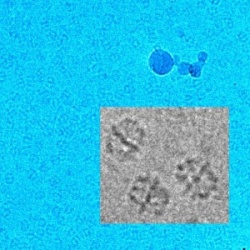Dec 3 2009
PACEM is a transmission electron microscope (TEM) designed to image low-contrast biological specimens. It was specially developed and installed at the Max Planck Institute for Biophysics (MPI-BP) by optical expert Carl Zeiss in Oberkochen and researchers from the Macromolecular Complexes excellence cluster in Frankfurt.
 Vitrified Fatty Acid Synthase, courtesy of Bastian Barton, Max Planck Institute for Biophysics, Frankfurt (Germany)
Vitrified Fatty Acid Synthase, courtesy of Bastian Barton, Max Planck Institute for Biophysics, Frankfurt (Germany)
PACEM stands for Phase contrast Aberration Corrected Electron Microscope which describes a special procedure that enhances even the slightest differences in contrast in the specimen, thus enabling specimen imaging that can be better evaluated.
Professor Dr. Werner Kühlbrandt, Director of the Institute for Structural Biology at the MPI-BP, explains: “The high-contrast, high-resolution imaging of biological specimens, from a macromolecule down to cells, is becoming increasingly important in many scientific inquiries. For example, the detailed structure of proteins delivers a lot of insights into their function. The PACEM system, which is an outstanding example of the successful cooperation between industry and research, will deliver the required images in unparalleled quality and thus provide new insights.”
Alexander Lazar, TEM Development Manager in the Nano Technology Systems (NTS) Division at Carl Zeiss SMT emphasizes that “PACEM is another example of our skill in developing innovative and unique subsystems for transmission electron microscopes and in integrating them into our modularly designed LIBRA 200 TEM platform. With these considerably enhanced imaging and analytical possibilities, we offer our customers added value and help them gain new scientific insights.”